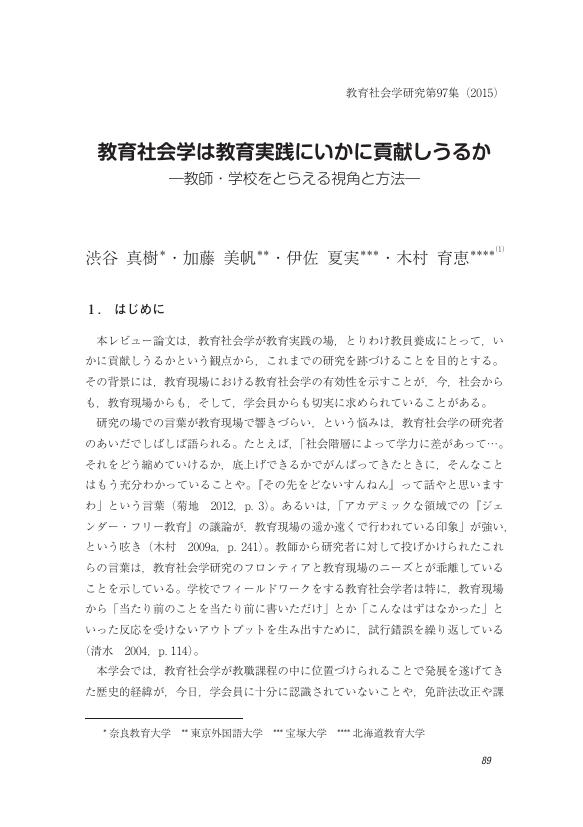- 著者
- 渋谷 真樹
- 出版者
- お茶の水女子大学ジェンダー研究センター
- 雑誌
- ジェンダ-研究 (ISSN:13450638)
- 巻号頁・発行日
- no.3, pp.149-162, 2000-03
1 0 0 0 OA 「帰国生」の批判力と変革力 校則に関する議論を中心に
- 著者
- 渋谷 真樹
- 出版者
- 日本教育社会学会
- 雑誌
- 教育社会学研究 (ISSN:03873145)
- 巻号頁・発行日
- vol.66, pp.115-133, 2000-05-10 (Released:2011-03-18)
- 参考文献数
- 17
- 被引用文献数
- 1
Japanese school children who have spent some time living abroad before returning to Japan, who are known as “returnees, ” often experience a feeling of uneasiness at Japanese schools. This uneasiness, in theory, may be a potential catalyst for a review of accepted school routines and behaviour, as well as for improvement in such routines and behaviour. Based on fieldwork at a special class for “returnees” at one junior-high school, this paper explores how the students' questions and criticisms regarding school uniform rules were resolved.The “returnees, ” who were accustomed to the freedom that prevails at schools outside Japan, believed that school uniforms were a sign that Japanese schools were strict. At the time of the study, the school itself was undergoing an intense debate over the use of uniforms, and there were frequent discussions among students. The “returnees” rejected arguments in favour of a school uniform based on ideas such as “commonsense” and “junior-high schoolness, ” citing a diversity of values. On the other hand, they showed signs of self-regulation, using phrases such as “the way it is here” and surmising what they thought “regular students” would naturally take for granted. They believed that as newcomers to the school, they had a responsibility to follow prevailing customs. Despite the teachers' intention to encourage independent decision-making, the “returnees” felt that adapting their behaviour to fit in was the best way of getting along with “regular students.”Although the “returnees” had been exposed to other school environments, they did not have the confidence to initiate change in their existing environment. Instead they adapted themselves to the dominant regime, enabling them to avoid conflict and engage smoothly in educational activities. At the same time, they gave up the opportunity to exercise critical thinking and argue in favour of change. The “returnees'” tendency to accept the legitimacy of local customs implies a firm internalized conformation to norms, and highlights the crucial influence of unequal power relationships between “returnees, ” “regular students” and teachers. A more active pedagogy needs to be pursued if education is to encourage critical thinking and the ability to bring about change.
1 0 0 0 OA 教育社会学は教育実践にいかに貢献しうるか
2007年8月のスイス調査では、日本語学校(教室)2箇所にて、継承語としての日本語教育を参観した。また、国際児7人、母親6人、教師5人に対して、日本語を中心とした日本文化への意識について、聞き取りをした。2008年2月のスイス調査では、日本語学校(教室)2箇所もて、継承語としての日本語教育を参観した。また、国際児7人、母親・父親4人、教師2人に対して、日本語を中心とした日本文化への意識について、聞き取りをした。また、日糸国際児が主催するコミュニティについて調査した。これらの調査から、1 国際結婚をしてスイスで子育てをしている日本人女性の中には、自分の子どもが日本語を習得することを希望する人々が少なからず存在する。その希望は時代によって異なり、ここ20年で日本語教育熱が増加・一般化している。2 スイスの日糸国際児が日本語学習の機会が得かられるか否かは、居住地域(日本人が多く住む都会の方が得られやすい)や、親が子育てに割ける時間(共働きの場合は得にくい)、家族の日本語学習への姿勢(非日本人の親やその家族が協力的な場合は得られやすい)などに影響される。3 スイスの都市部には、継承語としての日本語教育の場が複数存在し、国際児を中心とした子どもの実態に合わせた教育が行われている。最長のものでは、20年以上の歴史をもつ。4 聞き取り調査を行った国際児は、子ども期に日糸であことをからかわれる等した者もいたが、おおかた自分と日本とのつながりに対して肯定的であった。子ども期に日本語学校・教室で学んだ者は、当時は日本語学習を面倒または負担に感じていたと語る者が多かったが、現時点では、日本語能力獲得できたことを高く評価していた。一方、日本語を習得しなかった国際児は、習得した方がよかった、これから習得したい、と語る者が多く、現に成人して学習する者も複数いた。
1 0 0 0 IR 人権・多文化教育の動向並びにニューカマーの家族の実態に関する調査研究
- 著者
- 生田 周二 田渕 五十生 渋谷 真樹
- 出版者
- 奈良教育大学教育学部附属教育実践総合センター
- 雑誌
- 教育実践総合センター研究紀要 (ISSN:13476971)
- 巻号頁・発行日
- no.11, pp.215-217, 2002-03
- 著者
- 渋谷 真樹
- 出版者
- お茶の水女子大学ジェンダー研究センター
- 雑誌
- ジェンダ-研究 (ISSN:13450638)
- 巻号頁・発行日
- no.3, pp.149-162, 2000-03
- 著者
- 渋谷 真樹
- 出版者
- 一般社団法人日本教育学会
- 雑誌
- 教育学研究 (ISSN:03873161)
- 巻号頁・発行日
- vol.74, no.3, pp.372-374, 2007-09
1 0 0 0 IR 日本の学校における在日教員の実践と意義 : 在日教員のライフストーリーから
- 著者
- 金 亜民 渋谷 真樹
- 出版者
- 奈良教育大学教育実践開発研究センター
- 雑誌
- 教育実践開発研究センター研究紀要 = Bulletin of Center for Educational Research and Development (ISSN:21865841)
- 巻号頁・発行日
- no.21, pp.89-98, 2012-03
